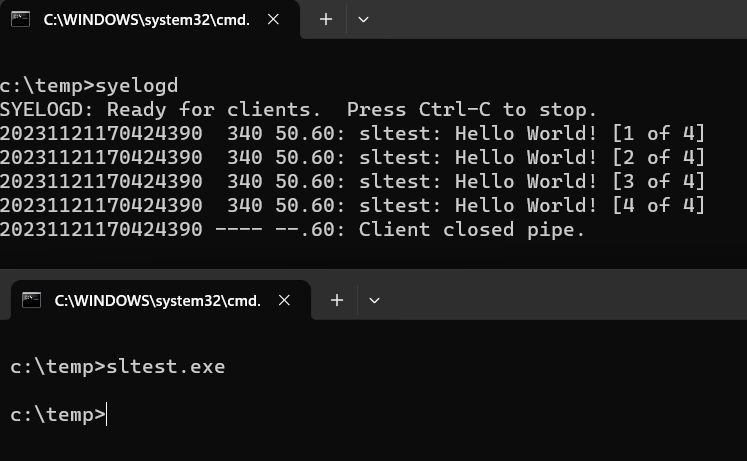Using withdll and detours to trace Win API calls
Table of contents:
- Introducing withdll
- Detours syelog library and log collector (syelogd.exe)
- Detours sample libraries that log Win API functions calls
- Injecting libraries with withdll
Introducing withdll
The Detours repository contains many interesting samples, some of which could be particularly useful in software troubleshooting. Inspired by one of those samples, named withdll, I created my clone of it in C# with some additional features. In this guide, I will present to you how you may use withdll with Detours samples to collect traces of Win API calls.
Detours syelog library and log collector (syelogd.exe)
Detours developers implemented a logging library, syelog, based on Windows named pipes. As you may see in the sltest example, it is straightforward to use. We may receive the logged messages with the syelogd application (also a Detours sample). Here is the result of running sltest and syelogd in separate console windows:

Each syelog message has a timestamp, process ID, facility number, severity code, and the textual message. Syelogd prints them in separate columns in the output. The timestamp could be either absolute (as in the example output) or relative to the last received message if you use the /d option. Having covered the receiver, let us focus on the senders.
Detours sample libraries that log Win API functions calls
The Detours repository contains a few syelog-based tracers. The most thorough tracer is traceapi. It hooks a vast number of Win32 API functions. More tailored loggers include:
- tracemem to trace heap allocations
- tracereg to trace registry operations
- tracetcp to trace TCP connections
- tracessl to trace plain text messages sent over TLS (it hooks EncryptMessage and DecryptMessage functions)
And, if we are not satisfied with the examples provided, it is quite easy to create a custom tracer (you may start by adding new hooks to, for example, trcmem.cpp).
The last step to start collecting Win API traces is to put the tracing libraries into the memory of the process that we want to analyze. And that is the place where withdll comes to the rescue.
Injecting libraries with withdll
The detours repository already contains a withdll sample that wraps the DetoursCreateProcessWithDlls function and allows you to start a new process with given DLLs injected. Unfortunately, it does not allow injecting DLLs into a running process. I decided to implement this feature in my version of withdll, and, to make it a bit more interesting, I reimplemented it in C#. Thanks to the excellent win32metadata and cswin32 projects, I could easily generate C# bindings for structures and functions defined in the detours’ header. You may download the compiled executable from the release page. I also added the detours sample tracers and syelogd.exe, so you may quickly run the first tracing session 😊.
Withdll is a 64-bit application (compiled with NativeAOT and statically linked with the detours library) but supports both 32-bit and 64-bit targets. An example command line to inject a DLL into a running process with PID 1234 may look as follows:
withdll.exe -d trcapi32.dll 1234
And to start, for example, winver.exe with injected traceapi libraries, you may run:
withdll.exe -d trcapi64.dll C:\Windows\System32\winver.exe
withdll.exe -d trcapi32.dll C:\Windows\SysWow64\winver.exe
Please note that you may inject multiple DLLs at once. If you compile a library for 32-bit and 64-bit architectures, add a “bitness suffix” to its base name, and withdll will replace the suffix if the target process is 32-bit. For example, if we have trcapi32.dll and trcapi64.dll in the same folder and we run withdll.exe -d trcapi64.dll C:\Windows\SysWow64\winver.exe, winver.exe instance will have trcapi32.dll in its loaded module list.
Finally, if you would like to always inject a DLL into a given application, you may use the Image File Execution Option registry key. However, to profit from this key, withdll must play the role of a debugger when launching the application. Therefore, when defining a Debugger value key, add an additional --debug switch to the withdll command, for example:
Windows Registry Editor Version 5.00
[HKEY_LOCAL_MACHINE\SOFTWARE\Microsoft\Windows NT\CurrentVersion\Image File Execution Options\winver.exe]
"Debugger"="c:\\tools\\withdll.exe --debug -d c:\\tools\\trcapi64.dll"
I also recorded a short video presenting the usage of withdll with the traceapi sample library:
